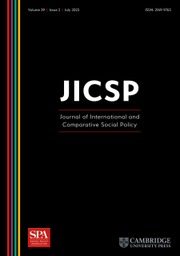Article contents
Workfare: conditioning the attitudes of benefit recipients towards social security?
Published online by Cambridge University Press: 09 March 2020
Abstract
Have increasing levels of conditionality fundamentally changed the attitudes of the unemployed towards social security, work obligations and welfare dependency? Both neopaternalist and governmentalist theorising suggests that workfare policies should have shifted this group's conceptions of self-interest over time yet previous evidence has been rather mixed. This article makes a fresh contribution to the literature by drawing upon New Zealand Election Study data (1990–2014) and New Zealand qualitative data (2007–2008; 2014) to analyse the attitudes of “undeserving” unemployed benefit recipients who are subject to work obligations over 21 years and by comparing their attitudes to those of “deserving” benefit recipients not subject to work obligations (the retired and students) and wage/salary earners. It finds a notable hardening of unemployed people's attitudes towards some welfare dependency propositions over time and evidence of “self-governing rationalities” being adopted by some unemployed individuals but, overall, attitudes amongst this group remain nuanced and ambivalent.
- Type
- Articles
- Information
- Journal of International and Comparative Social Policy , Volume 32 , Issue 1 , February 2016 , pp. 17 - 35
- Copyright
- Copyright © 2016 Taylor & Francis
References
- 3
- Cited by




